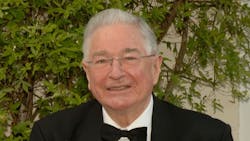Whether in companies, countries or communities, those who would lead would do well to learn from the late David Williams, my friend of a quarter century and, in a special way, a mentor to this day.
By every measure, Sir David Glyndwr Tudor Williams was a remarkable person. A distinguished scholar. A challenging author. A distinguished professor of law. An innovative president of Wolfson College, Cambridge. The first modern full-time Vice-Chancellor of the ancient University of Cambridge. A gentleman. A master of words. A person whose truest measure of greatness was and remains the humanness of his being.
David Williams loved language. He had the remarkable ability to make words fit the circumstance, whether in a lecture hall, in his office in the Old Schools, in a conversation with a University colleague, in conversation and consultation with those in government, in conversations with any of his many friends, or, most important, in the daily interplay of words with his family.
In public and in private, David Williams had the rare ability to speak in marvelously well-constructed sentences and phrases, to speak with humor, and to speak with authority. No one who ever heard his magnificent voice could mistake his seriousness, his purpose, or his lack of pretense.
Yet always at the core was the message—the words which David Williams shared, the thoughtfulness they reflected, and the inspired intellect they communicated.
"David Williams was a master teacher, because he was a master of words."
David Williams was a master teacher, because he was a master of words. And, significantly, those in the profession of law and in the storied University, of which he was the chief executive officer, have not been the only beneficiaries.
By his words and no less by his example, David Williams taught also so many people beyond the profession and beyond the University principles of civility and responsibility, principles of education and excellence, and principles of diversity and dedication.
Ultimately, David Williams celebrated life—and encouraged others by his example to celebrate life and, especially, to nurture and cherish their humanness.
This is another of a series of occasional essay by John S. McClenahen, an award-winning writer and photographer who for four decades covered international economics, public policy, and management principles for IndustryWeek and was the first Press Fellow from the United States at Wolfson College, Cambridge. This essay is in part adapted from a letter of remembrance sent to Lady Williams shortly after Sir David’s passing in the autumn of 2009.
About the Author
John McClenahen
Former Senior Editor, IndustryWeek
John S. McClenahen, is an occasional essayist on the Web site of IndustryWeek, the executive management publication from which he retired in 2006. He began his journalism career as a broadcast journalist at Westinghouse Broadcasting’s KYW in Cleveland, Ohio. In May 1967, he joined Penton Media Inc. in Cleveland and in September 1967 was transferred to Washington, DC, the base from which for nearly 40 years he wrote primarily about national and international economics and politics, and corporate social responsibility.
McClenahen, a native of Ohio now residing in Maryland, is an award-winning writer and photographer. He is the author of three books of poetry, most recently An Unexpected Poet (2013), and several books of photographs, including Black, White, and Shades of Grey (2014). He also is the author of a children’s book, Henry at His Beach (2014).
His photograph “Provincetown: Fog Rising 2004” was selected for the Smithsonian Institution’s 2011 juried exhibition Artists at Work and displayed in the S. Dillon Ripley Center at the Smithsonian Institution in Washington, D.C., from June until October 2011. Five of his photographs are in the collection of St. Lawrence University and displayed on campus in Canton, New York.
John McClenahen’s essay “Incorporating America: Whitman in Context” was designated one of the five best works published in The Journal of Graduate Liberal Studies during the twelve-year editorship of R. Barry Leavis of Rollins College. John McClenahen’s several journalism prizes include the coveted Jesse H. Neal Award. He also is the author of the commemorative poem “Upon 50 Years,” celebrating the fiftieth anniversary of the founding of Wolfson College Cambridge, and appearing in “The Wolfson Review.”
John McClenahen received a B.A. (English with a minor in government) from St. Lawrence University, an M.A., (English) from Western Reserve University, and a Master of Arts in Liberal Studies from Georgetown University, where he also pursued doctoral studies. At St. Lawrence University, he was elected to academic honor societies in English and government and to Omicron Delta Kappa, the University’s highest undergraduate honor. John McClenahen was a participant in the 32nd Annual Wharton Seminars for Journalists at the Wharton School at the University of Pennsylvania in Philadelphia. During the Easter Term of the 1986 academic year, John McClenahen was the first American to hold a prestigious Press Fellowship at Wolfson College, Cambridge, in the United Kingdom.
John McClenahen has served on the Editorial Board of Confluence: The Journal of Graduate Liberal Studies and was co-founder and first editor of Liberal Studies at Georgetown. He has been a volunteer researcher on the William Steinway Diary Project at the Smithsonian Institution, Washington, D.C., and has been an assistant professorial lecturer at The George Washington University in Washington, D.C.
